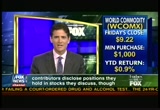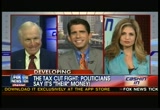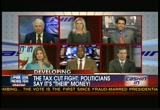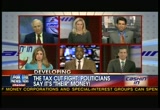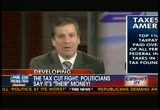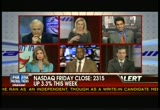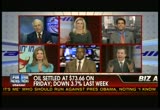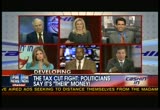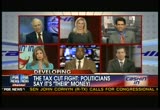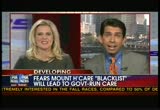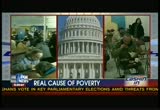tv Cashin In FOX News September 18, 2010 11:30am-12:00pm EDT
11:30 am
income. >> david: what is world commodity fund? >> way to play the run-away spending. >> david: commodities. neil, you like it? >> no. 1.6% to own the thing. >> david: that's it for "forbes on fox." see you next week. it would be borrowing $700 billion in order to fund the tax cuts, for the wealthiest americans. $700 billion to give a tax cut worth an average of $100,000 to millionaires and billionaires. >> cheryl: the president sticking to his guns when it comes to sticking it to top earners, but more lawmakers firing back saying extending all the bush tax cuts won't cost the government a dime. because it's the people's money, not washington's. we just need to spend less. so who is right here? well, hi, everybody, i'm cheryl casone. welcome to "cashin' in." our "cashin' in" crew this
11:31 am
week -- wayne rogers, jonathan hoenig, tracy byrnes, with charlie gastparino from the fox business network. pick up his book this october. there is the cover. also joining us, christian dorsey from the economic policy institute. welcome to all of you. all right, wayne, no, way, you're fired up over this. the president says extending all the tax cuts will cost the government money. yes or no? >> well, i'm not so fired up as i am startled by the logic that says hey, by the way, sticking up a guy, you know, robbing a guy and saying i'm going to take your money before you can lend it to me. it's crazy. the government is spending money they don't have. they don't have it yet. so how can the president say oh, this is going to cost money? it's my money. and they're going to take it. it's crazy. let me tell you something else. you realize that the top 1% of the people in the united states paid 19% of the taxes
11:32 am
prior to the bush tax cut. after the bush tax cut, those same 1% paid 36% of the taxes. the top 10% paid 49% before the bush tax cut. they paid 68% of the taxes afterward. right now, you've got 3% of the people in the united states carrying the tax load for the other 98%. there is something wrong. >> cheryl: christian, aside from the income disparity and of course the tax burden disparity that wayne is talking about, at the end of the day, is it right for the president to be so sure and say this isn't going to cost anything? >> well, it is going to cost the government money to fund the society that we all want. let's get some facts straight here. the president's plan is to see that everyone, every household on their income up to $250,000 has permanent tax cuts. he's only talking about increasing taxes on to family incomes above $250,000.
11:33 am
as wayne says, that is about 2% of the population. and when we talk about what this is going to cost all of us in the form of decreased services, decreased opportunities to pay down the debt, it amounts to a huge give-away for people who don't need it. >> cheryl: yeah, but christian -- >> the costs are larger when you tell the small business owners that they can't go out and hire people. they can't go out and expand their businesses because their tax bills are going up. look, you raise taxes, you know what the wealthy do? they figure out ways to not pay them. you keep tax rates low, i'll pay my bill and walk away. tax revenue increase when the rates are lower. that is certainly a fact. >> cheryl: charlie -- >> whether the tax rates are higher or low, it has nothing to do with it. >> incentive is not there if the rates are lower. >> cheryl: if you talk about the 2%, the top 2% that is the hot button issue, this group. they do represent -- >> people, entrepreneurs, small business --
11:34 am
>> cheryl: they represent 25% consumer spending. >> that is the problem with the static analysis that christian and president uses, it doesn't take into account the destimulative activity that occurs when you tax people that produce. it's just a fact that in the 1980s, believe it or not, the tax revenues went up. why did they go up? we took the tax rates down. i think the problem is, and here is the interesting issue about this. if you talk to economists on the left and the right, they will tell you we need to stimulate the economy. the only person we hear saying destimulate the economy is the president of the united states. economically insane. >> cheryl: the fear is you raise taxes no matter who you do it on, top 2% or middle class or anybody, we have a down economy and it's the worst time to raise tax on anyone. >> i agree with that but even the top 2% have no less rights than the struggling homeowner.
11:35 am
i don't care if it's a small businessman. the playboy sipping his don perion and partying all day long, he earns that money. not made on the back of the poor, not made through the stimulus or redistribution or the president's other favorite tools here. the president seems to assume that the rich, the top 2% are guilty and his job as commander in chief to pass -- >> i don't think it costs. i don't think it will cost the government anything to keep the rates the way they are. you will be stimulating the economy. and that helps bring in tax rates. >> cheryl: that is the thing. we argue that -- >> it could bring money in. increase revenue. not cost anything. actually, a good thing to keep rates down. money comes in to the coffers when you are not scaring me off. talk about the sentiments, though, too. if i'm scared my rates are going up, i'm not doing anything except calling my accountant and figuring out how to not pay them. tax revenues go down when that happens. >> cheryl: hold on, christian. i want to go to wayne, this is the connection between the
11:36 am
consumer sentiment and how they feel about the economy and whether or not they spend. getting back to the $700 billion issue. wouldn't it be better to be within the system? leave it to the markets, not have the government hold it under $1 billion but let the country have $700 billion? >> yeah. the fact of the matter is if you want to talk about facts instead of emotions here, the facts of the matter are from 2003 to 2007 the deficit, this is after the bush tax cuts. the deficit actually fell by $219 million. that's the congressional budget office report. if you want to argue with the facts, you can put on blinders and hit yourself in the head with a wall or something. [ laughter ] let's be really clear here -- >> let's be clear here. >> cheryl: charlie? >> they're not using the tax decrease to pay down deficit. >> cheryl: right. >> this president embarked on
11:37 am
a massive spending spree. bill clinton at the very least when he deleted the tax cuts in the first term, which i believe were bad and slowed down the economy, at least that money went for deficit reduction. this money is going so the government can spend and allegedly create jobs. by the way, you saw how the great stimulus package worked. >> cheryl: christian, can you respond to that? is it better used in the hands of the government who seems to be on quite the spending spree in the last year-and-a-half? >> spare me populism. this is money put in hands of people who already have more money than they spend. >> they employ people. >> allow me to finish my point, please. empirical analysis shows that the folks save more than they spend. >> that's good? >> it makes sense. [ overtalking ] >> cheryl: hold on, guys. charlie? [ overtalking ] >> you make it sound like they have money in a mattress when they save. >> if you'd allow me to finish the point --
11:38 am
>> they employ teachers -- >> go ahead. >> -- group that you align yourself with, the pensions go up. >> christian, respond, sir. >> well, as we saw during the 2000 business cycle, it was the first business cycle on record where despite the massive tax cuts we had decline in employment. we had decline in family income. we had decline in economic growth. >> cheryl: let him finish. >> the tax cuts came in response. >> we had a recession going -- >> i'm talking about the business cycle. the business cycle, charlie. the period of expansion. >> we had a recession -- >> all right, fine. move on. >> cut down taxes and employment went up. >> but christian what you are talking about is a redistribution of wealth. you're saying because of the wealthy keep their money that's wrong and therefore i should take it and give it to someone else. >> they don't keep their money -- [ overtalk ] >> cheryl: christian, got to be the last word. >> we're not talking about
11:39 am
anything that is new or burdensome. >> yes, we are. >> cheryl: okay, guys. i tell you -- >> recession is over -- >> cheryl: i can't hear who is talking. don't blame the law for higher premium? white house says the real fear. [ inaudible ] and what banks demand fannie and freddie do now to have critics saying get ready for housing to crumble even more. you know, fresh green beans lose half their vitamin c in a week.
11:40 am
so, you can eat them right here... or eat green giant beans at home... ...frozen within 8 hours to lock in nutrients. up to you. [ green giant ] ho ho ho ♪ green giant. having the right real estate agent on your side is more important thanver. at remax.com, you can find th, whether you're trying to sell of hopg to buy. nobody sells more real estate than re/x. visit remax.com today.
11:42 am
>> cheryl: blame us for rate hikes and we'll tell you to take a hike. this week, health and human services secretary kathleen sebelius warning companies not to say the healthcare law is forcing them to charge customers more. she's keeping a list and threatening to exclude names on the list from exchanges set up by the government. tracy, you say the blacklist is premeditated and the real goal is to drive them out of business. and usher in basically universal healthcare. >> heck, yeah. look what she is doing. she said obama care is costing you more, hmm, but you can't pass it on to consumers. what does it mean? it cuts in the bottom line. the companies will eventually not be able to survive unless they increase premiums. she is saying you can't do that? she is pushing them out and we look at socialized medicine down the road. >> cheryl: christian, one argue in the the healthcare debate, not enough to drive
11:43 am
down costs. insurance companies are saying in their defense, rightly so, our costs are going higher. we have to raise the rates. >> well, i don't know why they are saying that. most of the healthcare bill is yet to be implemented and will be phased in over the next eight years. if prices respond to the market, then the market hasn't evolved. i understand why secretary sebelius was a little upset. she is looking at in 2009, top health insurers had a record profit and are on pace for 2010 the exceed that. she is also looking at facts that say over the last 20 years they have gone from spending 95 cents for every premium dollar on medical care to only 81 cents. the top executives in the top insurance companies made 167% increase increase. >> cheryl: this is still a
11:44 am
private industry. >> no, no, no it's not. we essentially, do we should be surprised -- christian just gave the left's whole talking points there. free margarets are destructive and we need government for a smart solution. as you alluded to, this wasn't a free market to begin with. an healthcare reform makes it even more government controlled. to tracy's point, when government gets to decide what is an appropriate rate increase, that's not a free market. the president ran on socialized healthcare. this is what he wants. this is ultimately what we're going to get. >> cheryl: tell you what, charlie, the argument to be made with the health insurance company on wall street is they're getting greedy. we have seen that in the past. not out of the realm of possibility. >> wall street firms have been bailed out ten times in 30 years. a little different. what is really shocking here is just that, how they don't hide the fact that they really do want to socialize the industry. it's not what the president -- >> he ran on it! >> i know.
11:45 am
give them points for honesty. >> and consistency. >> it's funny. they talk about profits. it's -- the problem with healthcare reform it's even more rigged. that is the scary part. >> cheryl: wayne, you could have the administration limit profits that the insurance companies pull in. that is basically anti-capitalist. >> the whole system is anti-capitalism. you can't have a third party decide who will get money between individuals. the patient is not dealing with the doctor. he deals with the insurance company. the insurance company is dealing with the federal government and the doctor is dealing with the company. it's flawed to start. with it has to be demolished to start over. you have a healthcare bill that consists of -- let me finish. it consists of 2400 pages. has anybody read it?
11:46 am
no. nobody read it in the government. they don't understand it and they passed it. idiocy and the government going berserk again. >> cheryl: let me bring christian back in to this. would it be fair to say an idea could be we go through and see what is working and not working in the healthcare bill. maybe change things up, instead of having kathleen sebelius come out and attack the industry saying how dare you. >> you bring up a great point. much of the healthcare bill has been pulley realized. not only not implemented but the regulations for them haven't been written. to say it's healthcare reform to drive up premiums isn't true. it's not been realized. the market has not been created yet. >> don't forget that the kids were automatically added on. you have college kids gone and preexisting claims gone. things started already. anticipation of what to come.
11:47 am
>> christian made outrageous statement. the market has not been created. the government has not created the market yet. i can't believe it. >> cheryl: the point -- what i do want to say here, charlie, is up to 26 years old they're on the plan. already kicked in. >> that's kicked in. you tell me one provision has taken them from a record profit situation to situation where the rate increases they propose -- >> no, no, no. >> you have no credibility. >> jonathan, projections that we are talking about? is that the issue? >> markets are smarter than maybe christian gives them credit for. of course, they anticipate finance or healthcare. people anticipate trying to keep the last semblance of freedom alive. i think the problem here, wayne, to your point isn't the number of pages in the regulation. it's basic premise that people had a right to healthcare.
11:48 am
right to action. not a freebie from the federal government. >> wayne, real quick. last word, sir. >> the point is you are adding 31 million extra people. no way in the world. some future date it has to be paid for. maybe not now but it has to be paid for. >> coming up, remember this? >> fannie mae and freddie mac are not in a crisis. >> cheryl: barney frank about to repeat history? what the massachusetts democrat is pushing fannie and freddie to do now that some say will make the last crisis look like a picnic. hey, lawrence, my parents want to talk to you.
11:49 am
oh. about what? uh, they don't really think you're an exchange student. what? they think you're a businessman, using our house to meet new clients in china. for reals, player? [ woman saks chinese ] they overheard a phone call. speaks chinese ] something about shipping with fedex to shanghai. and then you opened a bottle of champagne. that was for a science project. [ man and woman speaking chinese ] i'm late for..occer... rehearsal. [ man speaks chinese ] you and i are cool? i'll be home by curfew. [ male announcer ] we understand.® you need a partner who can help you go global. fedex. >> cheryl: coming up, barney frank at it again to call for fannie and freddie to back more home loans. didn't that get us in the mess in
11:52 am
hello, everybody. i'm uma pemmaraju in washington. lisa murkowski has now re-entered the senate race as a write-in candidate, after losing the primary to joe miller by 2,000 ballots. the republican establishment is reiterating support for miller. newt gingrich is headlining today's conservative value voter summit in washington. the latest darling, delaware g.o.p. candidate christine o'donnell had her national coming out party there on friday. brand new fox polls are showing the economy is the top issue for voters. how will the religious right will make sure faith-based issues are addressed? we ask tony perkins. and taliban militants killing two civilians in a series of attacks as voters heading to the polls in afghanistan today. turn-out has been relatively low. 2,500 candidates are vying for 249 seats. more on this, top of the
11:53 am
hour. stay with us. >> cheryl: fearing growing that barney frank is looking to take another gamble on housing. in 2003, the massachusetts democrat saying he wanted to roll the dice on housing. we know how well that went. fast fared to today and now he is calling for congress to increase loan limit for fannie and freddie. something that was supposed to be temporary. the mentality is what caused housing to collapse in the first place. >> this would be funny if it wasn't true. government intervention creates the bubble, freddie, fannie, and barney frank. bubble collapses because of the reality of this. the solution is to -- wait for it -- create another bubble with the bail-out, hope for the homeowners and help for homeowners and reregulate everything but -- wait for it -- barney frank, freddie mac and fannie mae. history repeats itself. >> but is the right one right
11:54 am
now the right one considering the state of the housing industry? >> absolutely, make sure you stabilize the high-cost areas so buyers can buy and buyers can sell. the loans and the amortizing loans, two private market invention are driver for the housing crash. if you don't believe that the government should be involved in the housing policy, are you then saying we should get rid of the mortgage interest tax deductions? >> absolutely. >> c'mon. >> yes, yes! >> but fannie and freddie are already fragile. >> fragile? >> cheryl: best i could come up with. >> probably words you can't repeat on television. this is the irony of this thing. by sort of propping up the market and make it easier for people to get the loans and they can't afford it, we'll drive the housing prices up beyond what the working class and middle class americans can afford, unless you turn to fannie and freddie or take out a crazy loan. that's the problem with the expansion of housing policy. they made the housing less affordable for the working class people.
11:55 am
>> cheryl: wayne, over $7,000 for a loan. too much? >> the idea of a market that was created by freddie and fannie originally to have a place where the banks sell their loan so you had a market is a good idea. jonathan was right when it talked about the intervention. when the federal government intervenes in this stuff it works. >> maxine waters and -- >> maxine waters and barney frank and all said you have to make the loops available for everybody. so everybody can have a home. >> tracy? >> please let me finish. >> i just want to say i think he's crazy. christian, albert einstein said the definition of "insanity" is doing the same thing over and over again and expecting a different outcome. that's what we're doing. >> wayne, i thought it was my turn! i thought they said it was my turn. go. >> cheryl: last word, wayne.
11:56 am
>> if you don't intervene -- franklin raines, president, he was a crook. the chief financial officer was a crook. the federal government was interfering in something otherwise good that turned upside down. >> wayne rogers, ladies and gentlemen. thank you to christian for joining us. great to have you on the show, sir. coming up, this will make you protest the folks regulating the banks. they want to recoup money they're losing because of the regulation. find out where to put your cash to avoid the rest. yellowbook has always been crucial to your business,
11:57 am
but now, to get it really cooking, you need a little website development. some transparent reporting, so you know it's working. online ads and 1-on-1 marketing consultation. yellowbook's got all that. yellowbook360 has a whole spectrum of tools. the perfect recipe for success. visit yellowbook360.com and go beyond yellow. ♪ [ male announcer ] every siness day, bank of america lends billions of dollars, to individuals, institutions, schools, organizations and businesses. ♪
11:58 am
working to set opportunity in motion. bank of america. i've been looking at the numbers, and i think our campus is spending too much money on printing. i'd like to put you in charge of cutting costs. calm down. i know that it is not your job. what i'm saying... excuse me? alright, fine. no, you don't have to do it. ok? [ male announcer ] notre dame knows it's better for xerox to control its printing costs. so they can focus on winning on and off the field. [ manager ] are you sure i can't talk -- ok, no, i get it. [ male announcer ] with xerox, you're ready for real business.
11:59 am
>> cheryl: time for what do i need to know for next week? >> the rate is highest since 1994. 14.3%. blame the government intervention. now we're going to see raising taxes, what? and we're also hearing that the banks, new bank regulation is causing bank fees to go up, too. crazy. >> cheryl: charlie? >> barney frank sees days of head of financial commercial committee to come to an end. look for max baucus to run it after mid-term. >> cheryl: wayne? >> you heard me talk about ford north the past. like it still. it had break-out thursday double normal volume. still a good buy. hold it. >> cheryl: you have been on that one. jonathan? >> ford is a great story, but honestly, i'm all about the clean, green economy. i think honda is a better stock. hmc another
124 Views
IN COLLECTIONS
Fox News Television Archive
Television Archive  Television Archive News Search Service
Television Archive News Search Service 
Uploaded by TV Archive on

 Live Music Archive
Live Music Archive Librivox Free Audio
Librivox Free Audio Metropolitan Museum
Metropolitan Museum Cleveland Museum of Art
Cleveland Museum of Art Internet Arcade
Internet Arcade Console Living Room
Console Living Room Books to Borrow
Books to Borrow Open Library
Open Library TV News
TV News Understanding 9/11
Understanding 9/11